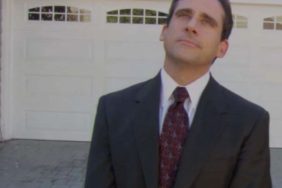Award-winning comic book creator Brian Michael Bendis has never been in more demand. When he’s not writing Marvel’s Invincible Iron Man or Guardians of the Galaxy adventures, he’s working on television shows like Sony PlayStation’s Powers (based on his own Eisner-award winning comic book series with Mike Avon Oeming) and Netflix’ Jessica Jones and consulting on Marvel Studios’ film franchises including Captain America, Avengers, and Guardians of the Galaxy.
Recently, CraveOnline caught up with Bendis to discuss the popularity of dark comic book material, the rise of female superheroes and the upcoming second season of Powers.

Crave: What’s it been like watching Powers evolve from an idea to comic book to TV series?
Brian Michael Bendis: It’s so surreal that I try not to even think about it. I walked onto these beautiful set where we’re filming in Atlanta, which people will see in the second season. Hundreds of people are working on these sets and it looks exactly like the comic. It’s crazy. So I really try not to think about it and go back to work.
How was work as a member of Marvel Studios’ creative community on franchises like the Avengers and Captain America helped with this Powers series?
That experience from the get-go was phenomenal for me because it was like advanced writing. Like whatever the doctorate of writing would be, you’re sitting in a room with all these excellent storytellers and you’re consulting for them, but you’re reading. You’re processing their decision-making. Filmmakers are like Joss Whedon and Kenneth Branagh are all coming from different worlds into the Marvel world. It’s like, “Don’t tell them, but I would have done it for free.”
What was it like working with Joss Whedon?
Joss Whedon I knew from before, but just to watch and process all the notes that are coming at him from all different directions as he commands as big a ship in pop culture as you can command, this Ocean’s Eleven of superheroes coming at you, and watching him do it with grace and style, at least in front of us, it’s quite impressive.
Do you have a favorite memory from that experience?
I’m a huge Kenneth Branagh fan and we’re in a room with him one day, just the creative committee, and he acted out the entire movie of Thor and did all the parts himself with Shakespearean flourish. I’m sitting there about an hour in thinking, “This is the best thing I’ve ever been part of. No one’s ever going to experience what we’re experiencing right here.”
The first season of any TV series is much like an experiment in Hollywood’s eyes. What did the success of the first season of Powers open up in terms of budget and scope for Season 2?
We were getting better as the season went on. Episode 6 looks significantly better than Episode 1. When you look at Seinfeld or Star Trek: The Next Generation or Buffy, there are a lot of shows that do that. They’re finding it because what they’re trying is so difficult. We’re not a normal cop show and we’re not a super hero show. We’re a cop show with this crazy element involved. Both Seinfeld and my favorite show, The Larry Sanders Show, really shot out crackling in their second seasons. We use that to pump us up and we really hit the ground running in Season 2.

Both Powers and Jessica Jones have a darker backdrop, something we’re seeing more and more on the big screen in Avengers: Age of Ultron and the new Captain America. How do you see comics reflecting the real world?
It’s interesting that of all the things I’ve done in the darker genre mash-up is the stuff that’s finding success in television. I’ve written a lot of very romantic and hopeful, youthful stuff that is not being made into television. But meanwhile all of the more f**ked-up stuff is finding a home. Powers and Jessica Jones were comics among all of these more traditional comics, and part of their appeal was that there are fans of super heroes that also want something else sometime. Some people don’t like traditional super hero stuff and they want the genre to reflect something dark and funny, which is what I like. Now we have as many super hero comic books shows on television as there are actual comic books, which is weird. And now we have Powers and Jessica Jones filling the same role on television as they filled in comics.
Why do you feel now is a good time to unleash Jessica Jones onto the world?
I’m happy Jessica landed so well. They debuted the series at midnight on Friday on the West Coast and by 2 a.m. my Twitter feed was flooded. People immediately had this reaction. What I loved about it is that I have this philosophy that full representation is not enough to show diversity. The diversity comes with the characters being dangerous and us being worried about the choices they will make.
We’re seeing in comics is that you create diverse characters and then nothing bad happens to them. I believe everyone should be treated equal. That means bad sh*t happens to everybody and good shit happens to everybody, and I’m happy that so many people respond to that with Jessica because that’s really what it’s supposed to be about.
How do you see this evolving in the future?
My goal is that in my lifetime — before my kids graduate high school — that we never have to even have to have a diversity question; that it’s not a representation question. That it’s so normalized in our culture that it’s not even a subject. And I’m trying to do my part. It’s always story first with me. But if there is a way to bring that story in from as many different points of view with as many unique characters as possible, that would be great.
I’m Jewish, and two of my children are African American, and we have a very diverse family. And the way people react to us is very diverse, so I apply that now to my work any way I can. It’s my reality. If every writer honestly brings their own reality to what they want to do for a living and doesn’t let anything stand in their way, we’re going to have a culture that’s so brilliant that we won’t even know what to do with ourselves. I do think the reason there are so many good comics right now and so many good TV shows is because it’s happening. It’s really amazing if you think about it.

How challenging is it to write screenplays and stories in the Marvel Universe trying to move around the whole 20th Century Fox X-Men license?
Most of what you read online isn’t as sinister as people have made it to be. I just came off of an X-Men run where literally every Tweet was some conspiracy paranoia about how Marvel has said, “Go f*ck the X-Men.” I’m working with the best artists in comics on the X-Men. And you’re insulting us by saying what you’re saying. The whole time I was on X-Men people were like, “You’re not allowed to create any new X-Men.” But I’m like, “Yeah, I just created 30 new X-Men.” I wanted to put some toys in the X-Men toy box and it’s like an honor to do that.
All I can say is everyone I work with in comics and everyone I work with at Marvel are good people who care about these characters more than you ever will. Even if you think you care about them more than you care about your family, believe me if anyone suffered all the pains and slings and arrows of getting a job at Marvel Comics, they love these characters with their whole heart. This isn’t just something you fall into. It’s a job that seven million people are waiting to take from you, so you have to earn your place at the table. Everyone there cares about and loves these characters, including the people who write the checks.
What’s your favorite Marvel memory to date?
It will go down in the history of all the great, lovely things that have happened to me, the fact that I wrote the first F-bomb in a Marvel Comic [in Alias, the mature comic book series that introduced Jessica Jones] is what makes me happiest. You would think there would be other things that make me happier. I don’t know why that made me so happy.








